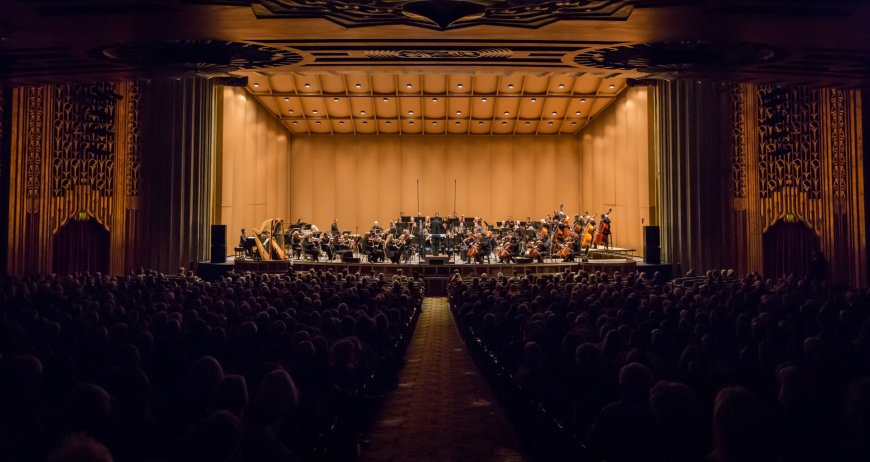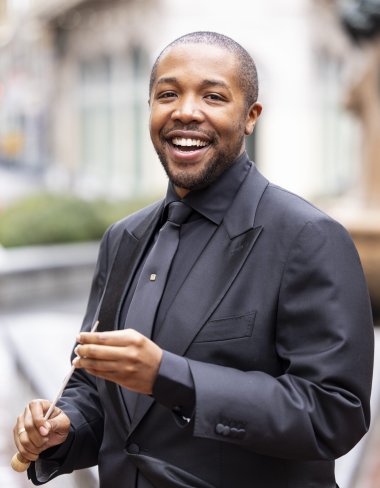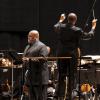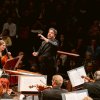
In the century and a half since Giuseppe Verdi’s Messa da Requiem premiered in Milan on May 22, 1874, the piece has taken on a world of associations far beyond its original source of inspiration: the life and work of Italian novelist, philosopher, and playwright Alessandro Manzoni.
Unmoored from its liturgical role as a Roman Catholic funeral Mass due to Verdi’s demanding operatic vision, the Requiem resonates powerfully in extreme historical moments, such as at the Nazi camp-ghetto at Theresienstadt (in today’s Czech Republic), where Jewish prisoners performed the Requiem more than a dozen times, or in 2021 at a concert by the Metropolitan Opera in New York to mark the 20th anniversary of 9/11.

The Oakland Symphony is slated to perform the Requiem on Nov. 14 at the Paramount Theatre. Conductor and music director Kedrick Armstrong said he wanted to pair the massive piece with more inviting music.
“With large-scale works like this, you need something else on the program,” he said, noting that orchestras often connect canonical repertoire to works by living composers. “But I couldn’t find anything.”
After an extensive search, Armstrong decided to commission a new work from Oakland-based pianist Cava Menzies, who is well-established in the jazz genre. Their discussions centered on the theme of “communal grief,” he said.
A founding music faculty member at the Oakland School for the Arts, Menzies was eager to tackle the commission. She’s written extensively for choirs and choruses, and this undertaking seemed like an ideal opportunity to expand her compositional palette in response to another fraught historical moment. Created in dialogue with Verdi’s Requiem, her three-movement “Suite for Humanity” aims to evoke the depths and heights of human experience.
“Like many people, I’ve been pretty devastated with the state of humanity — nationally and internationally — and really struggling to find words, mulling over what I wanted to say musically,” Menzies said. “When the commission came, I was thinking about imploring humanity to remember itself. It’s a depiction of what I see happening, the devastating lows and the potential of what we could be.”
She channeled her dismay and dogged optimism into the very specific assignment of composing a piece to precede the daunting Requiem.
“Suite for Humanity” partly draws on her study of film scoring in graduate school. She worked closely with Armstrong on this work — her first for full orchestra — which touches on an array of musical idioms. He knew he’d made the right choice when she sent over an MP3 of a choral composition she’d set to the Paul Laurence Dunbar poem “Invitation to Love.”
“It was exactly what I was looking for,” Armstrong said. “The text by Dunbar was stunning, such a perfect segue into the world and landscape of Verdi’s Requiem.”
She ended up expanding “Invitation to Love” for the third movement of “Suite for Humanity.” The first movement, which is purely orchestral, evokes war, chaos, and the fallen state of the world. “It slowly goes into a descending section, what we witness in the aftermath of the storm,” she said. “Kedrick encouraged me to write really descriptive language for the orchestra, and I said to play it like a thousand angels descending.”

The second movement involves a pared-down choir and orchestra. There’s no text for the voices (“Words fail; it’s ineffable,” Menzies said) as she stacks thick, warm harmonies meant to suggest immersive healing. Menzies gradually integrates the full orchestra and choir in the third movement to capture the wonder and beauty of the universe. She compressed Dunbar’s verse, emphasizing lines like “As the bird flies home to its welcome nest. Come when my heart is full of grief,” while repeating the phrase “you are welcome” again and again as an incantation.
Armstrong helped make sure “Suite for Humanity” would accomplish its daunting mission. Menzies said she knew she had his support every step of the way.
“He was so hands-on in this process,” she said. “I learned a great deal from him. It really harkened back to the old days of having a mentor. I’d bring him the score and we’d go over it, and I was really surprised by how much time he was willing to dedicate, making sure every detail was exactly how we wanted it to be.”
Armstrong clearly delights in the whole process, from conceiving of the project to collaborating with a composer to bring a promising new work to fruition. At 30, he’s still very much stretching his wings. The Nov. 14 program will be his first time conducting Verdi’s Requiem, but he feels like it has been a long time coming.
“I discovered it as a high school student and I was gripped by it,” he said. “I’ve spent so many hours sitting at the piano playing through the score and listened to so many different recordings. I saw a live performance at the BBC Proms in London [in 2014]. I feel it in my bones.”
It’s a feeling he’s eager to share with audiences in Oakland, alongside a hometown star ready to present her most ambitious work yet.




